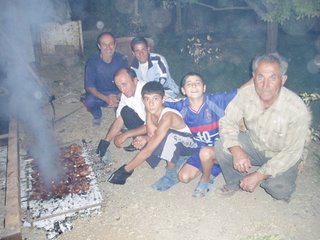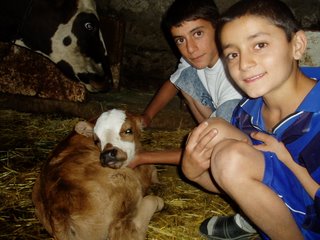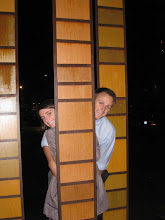August 30, 2006
All Peace Corps volunteers get a Newsweek magazine delivered to our mailboxes in Yerevan every week. I was reading the July 24th issue (I’m a bit behind) the other week and in the Technology section there was a story called: "Games for Good." Students at the University of Denver developed a videogame called Squeezed as a part of a growing trend of socially conscious games. The article says that there is a "Games for Change" conference held at the New York School in NY. In the game, you are a frog who happens to live on a farm. Your aim is to pick as many grapes, oranges and other fruit as quickly as you can. The fruit, however, is going to rot, and you’ve got to compete with worms, donkeys and dragonflies. What’s more, the farmer might decide to spray pesticides, which puts you in such a drunken stupor that picking up fruit is a challenge. You may just be a frog, but you have a family and community to support in another country. The ‘juice’ you collect from the fruits you pick up is paying for food and medical care back home. Without it, your family may starve. The game is intended to raise awareness among well-off young people by putting them in game situations that resemble those of immigrants and poor people in real life. The characters serve as stand-ins for migrant workers from Latin America. The reason I share this is that the description of Squeezed very much illustrates the life of the families I’ve lived with in Armenia. I’m not sure how they do it, but I’m in awe of their strength. It’s not just Latin American immigrants to America; people are ‘Squeezed’ all over the world.
September 7, 2006,
School…and life for that matter would be so much easier if I spoke Russian. Our building is being remodeled and it’s a hectic mess trying to figure out where we as teachers should go-let alone where the students are supposed to be. It took me two weeks of observation before I finally realized that the room the teachers are currently using as a lounge is actually the health classroom where we’ll be able to teach. All day yesterday my counterpart was telling me that lessons will be easier when we have our ‘cabinet’. Normally I can recognize when people are speaking to me in Russian, but for some reason I actually thought that she was telling me that we needed our cabinet. I assumed maybe it was full of some health materials or resources of some kind. After awhile, though, I started to doubt this assumption and figured that she was probably calling a classroom a cabinet. I went home and asked my sister and sure enough, cabinet is the Russian word for classroom. I’m debating whether or not I should start spending my open periods in Russian class with the first grade. I think that after I conquer Armenian I’ll work towards learning Russian—it sure would come in handy in this part of the world.
They seem to like me in school; I get along with all the teachers, construction workers and cleaning staff. The students are fairly well-behaved and they listen to me despite my poor language skills. I’ve spent the past 2 weeks giving introduction after introduction, but everyone wants to know the same thing. The adults want to know about my family at home and where I come from, the kids want to know if I drove in America and what kind of car I had. My speech at the opening day ceremony consisted of a congratulations on the first day of school and welcome back, who I am and the teacher I’ll be working with, where I come from, what I studied in America and my favorite line: "If you work hard in school you will be successful."
When I have open periods I like to visit the English class (at this point in my language studies it’s the only time I can stand up in front of students and be sure they’re retaining the information I give them). The ninth graders were really interested in what American 15-year-olds are like. I told them that in America men and women are equal, so boys have to help with household chores just as much as the girls do. I said that my brother is expected to clean the bathrooms and wash the dishes. They all were astounded and started laughing (a testament to the strongly divided gender roles in this country). One brave boy stood up and said: "but in Armenia if men do housework they’ll get made fun of!" I asked why but he didn’t have a response. It’s just the way things are. I also told them that at 15 people can start learning to drive and that we are very consumed with getting our license so that we can have independence. They were confused by this, because in Armenia being able to operate a motor vehicle gives you no more independence than turning 5 years old. Families live together (there are 3 generations in my house) until marriage, and even then you probably will only move down the street. They couldn’t imagine how ownership of a car would provide any sort of escape from parents—where would they go? In the class I tried to explain that they had more potential than they realize. I explained that they need to start thinking about their futures and what they want to do after graduation next year (compulsory school only lasts until the 10th ‘form’). The same boy that said that men shouldn’t do housework raised his hand and told me it’s hard to achieve anything when you go to school in a small village. I told refuted his statement with the argument that not all schools in America are rich and full of resources. I told him that if there’s something he wants to do, or a problem he wants to solve I’m here to help….we’ll see what happens.
Today we had a very interesting lesson with the 8th graders; it’s one of my favorite activities from home. You are given a list of values such as health, freedom, love, a good family, beloved work, education, friends, a fatherland etc… and you must choose the top five that you value the most and then rank them. I thought that the 13 and 14-year-olds would surely value friendship as one of their top values (I remember being consumed by ‘fitting in’ at that age). I was surprised to learn, however, that their top values tend to be family and physical safety. When I thought about it a little more I realized that these answers are characteristic of the Armenian culture. Everything I’ve observed in living with two families these past 3 months points to the fact that family is of highest importance. After the history these people have lived through I understand why physical safety would be valuable as well. I debated telling them what’s valued in America, (money and work) but decided instead to follow the lesson plan and explain that if you don’t have health you can’t enjoy the other values (your family and friends will suffer if you are unhealthy, you aren’t safe, you’re not really free etc…). Health is the foundation of the other values, and it’s the reason why it’s so important to learn.
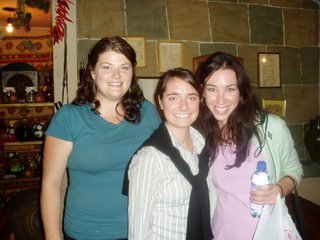 Volunteers in the big city for a night. We had dinner at a restaruant called 'my village' with the regional director.
Volunteers in the big city for a night. We had dinner at a restaruant called 'my village' with the regional director.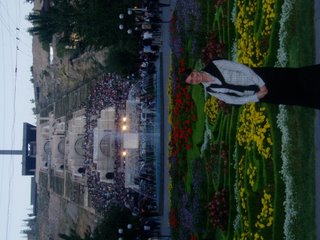 In Yerevan: At an outdoor concert on Tuesday night.
In Yerevan: At an outdoor concert on Tuesday night.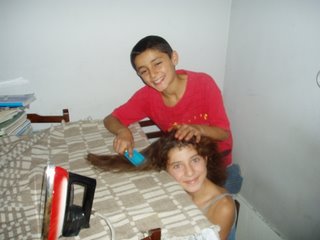 Hermine would kill for straight hair so the best solution is to iron it...I vaguely remember my mom telling me they used to use a real iron on hair 'back in the day'.
Hermine would kill for straight hair so the best solution is to iron it...I vaguely remember my mom telling me they used to use a real iron on hair 'back in the day'.